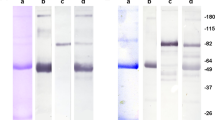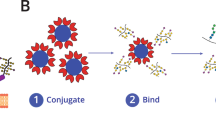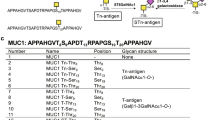Abstract
Urinary mucins which express determinants for the anti-breast carcinoma monoclonal antibody, NCRC-11 (IgM), closely resemble the mammary mucins found in milk fat globules and carcinomas. An IgG3 monoclonal antibody, C595, was prepared against urinary mucins isolated on a NCRC-11 antibody affinity column, and this 'second generation' antibody was shown to have a very similar pattern of reactivity to the original NCRC-11 antibody. By immunohistology, the profile of reactivity of both antibodies with tumour and normal tissue specimens was virtually identical. Both antibodies reacted with epithelial mucins isolated from breast tumours or normal urine using an NCRC-11 antibody affinity column, although the antibodies were unreactive with other antigen preparations. Heterologous immunoradiometric assays ('sandwich' tests) confirmed that NCRC-11 and C595 epitopes were co-expressed on the same molecule. C595 antibodies inhibited the binding of radiolabelled NCRC-11 antibodies to antigen, suggesting that the two epitopes were in close topographical proximity. The protein core of the mammary mucins has recently been shown to consist predominantly of a repeated 20 amino acid sequence (Gendler et al., 1988). Peptides with this complete sequence and small fragments were synthesised, and the C595 antibody was found to recognise an epitope within this repeat. The ability to identify and synthesise monoclonal antibody-defined determinants, as well as those in the adjacent or overlapping sequences within the protein core of epithelial mucins, is viewed as a strategy for facilitating the production of antibodies of new and novel specificity to complement the panels of existing anti-breast cancer reagents.
This is a preview of subscription content, access via your institution
Access options
Subscribe to this journal
Receive 24 print issues and online access
$259.00 per year
only $10.79 per issue
Buy this article
- Purchase on Springer Link
- Instant access to full article PDF
Prices may be subject to local taxes which are calculated during checkout
Similar content being viewed by others
Author information
Authors and Affiliations
Rights and permissions
About this article
Cite this article
Price, M., Pugh, J., Hudecz, F. et al. C595 – a monoclonal antibody against the protein core of human urinary epithelial mucin commonly expressed in breast carcinomas. Br J Cancer 61, 681–686 (1990). https://doi.org/10.1038/bjc.1990.154
Issue Date:
DOI: https://doi.org/10.1038/bjc.1990.154
This article is cited by
-
Development of [225Ac]Ac-DOTA-C595 as radioimmunotherapy of pancreatic cancer: in vitro evaluation, dosimetric assessment and detector calibration
EJNMMI Radiopharmacy and Chemistry (2023)
-
In vitro characterisation of [177Lu]Lu-DOTA-C595 as a novel radioimmunotherapy for MUC1-CE positive pancreatic cancer
EJNMMI Radiopharmacy and Chemistry (2023)
-
Lewis x is highly expressed in normal tissues: A comparative immunohistochemical study and literature revision
Pathology & Oncology Research (2007)
-
MUC1 expression and anti-MUC1 serum immune response in head and neck squamous cell carcinoma (HNSCC): a multivariate analysis
BMC Cancer (2006)
-
Influence of sialic acid removal on MUC1 antigenic reactivity in head and neck carcinoma
Pathology & Oncology Research (2005)



